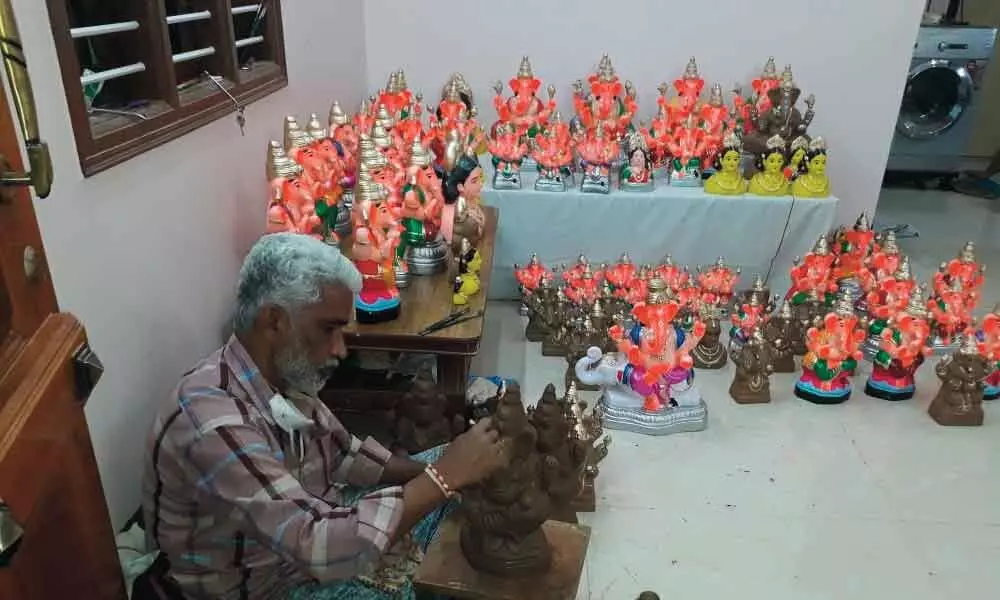Live
- They always want me to win, and now I feel lucky to have been offered a story like ‘Zebra’: Satyadev Kancharana
- ‘Democracy first, humanity first’: PM Modi in Guyana's parliament on two countries' similarities
- PKL Season 11: Telugu Titans register third straight win to top standings
- Is Pollution Contributing to Your COPD?
- NASA Unveils Underwater Robots for Exploring Jupiter's Moons
- Additional Central forces arrive in violence-hit Manipur
- AR Rahman and Saira Banu’s Divorce: Legal Insights into Common Issues in Bollywood Marriages
- 82.7 pc work completed in HPCL Rajasthan Refinery area: official
- Curfew relaxation extended in 5 Manipur districts on Friday
- Tab scam prompts Bengal govt to adopt caution over fund disbursement
Just In
Gombegalu makers sit idle as Coronavirus strikes brutal blow


Gombegalu makers sit idle as Coronavirus strikes brutal blow
For more than 42 years, Ramanna Manjunath, 52, has been keeping the family’s traditional craft of making Karnataka’s famed ‘Gombegalu’ (Dasara dolls) alive.
For more than 42 years, Ramanna Manjunath, 52, has been keeping the family's traditional craft of making Karnataka's famed 'Gombegalu' (Dasara dolls) alive. Around this time of the year, his hands are usually busy with a flood of orders for 'Gombegalu' to celebrate 'Gombe Habba' or the festival of dolls which is one of the key cultural indicators and a major attraction during Navaratri.
The 'Gombe Habba' is closely associated with the Mysuru Dasara. To celebrate 'Gombe Habba', the Mysuru rulers dedicated an entire pavilion in the southern entrance of Mysuru Palace called 'Gombe Thotti' to exhibit a collection of dolls. It was originally meant for the purpose of exhibiting dolls during the annual Dasara festivities (or Nadahabba), the main attraction being the Golden Howdah which is mounted on the elephant during the Dasara procession. The tradition of exhibiting collection of dolls obtained during the Vijayanagar times and the same tradition was continued by the Mysuru rulers. In fact, the practice was not confined to the Palace, but was widespread throughout the state. Even to this day, the tradition has not disappeared.
Almost every house in Bengaluru and the rest of Karnataka celebrates 'Gombe Habba' where the dolls and figurines are displayed in exquisitely arranged themes narrating a legend from Hindu texts and members of the family spanning all ages participate to make it the spectacle that it is. Young girls are invited and are given 'Gombe Bagina', a package containing sweets, toys and a pair of wooden or clay dolls so that they can carry the tradition when they get married and move to a new home. During Dasara, the Gombegalu" (Dasara dolls) are available everywhere – from stores to makeshift stalls.
With Dasara festival nearing, Ramanna Manjunath had been busy rolling dolls made of clay. Every day, he sits in one corner of the room at his home-based doll making factory 'Chamundeshwari Nilaya' in Yelanhaka's Maruthi Nagar 64, which is his centre of production for the lifelike clay dolls infusing them with colour. "My father Basappa Ramanna learnt the art of making these handmade clay dolls from his father. It is an arduous task to craft the dolls. The soil has to be soft to give intricate shape. We use delicate tools to craft the clay," Manjunath explains.
His subjects are mostly religious, representing the entire pantheon of Hindu Gods and Goddesses, and mythological stories from religious texts. At other times, he gives expression to elephants, horses and birds.
August till November are busy months with three important festivals celebrated during the period. Manjunath and many like him begin their work sometime in June. During Ganesh Chaturthi, he barely managed to make Rs 1.50 lakh selling around 1,500 Ganesh idols this year against Rs 2 lakh he mopped up last year. The price ranged between Rs 100 for eight inch Ganesh idol to Rs 800 (25 inches). 'Gombegalu' range from few inches to almost 1 ft. in height and sold in sets, the smallest set is made of 8 pieces measuring five inches and priced at Rs 1,000. "A set of 10 pieces, each measuring eight inches, is priced around Rs 2,000, while a set of 15 dolls measuring nine inches will cost you Rs 2,800. A set of 34 pieces are priced at Rs 4,500. The set of Nava Durga, the nine incarnations of Goddess Durga, will cost Rs 6,000," says Manjunath.
The pandemic has cast a spell on his business, in Manjunath's words "thumba dull". "I sold Rs 4 lakh worth Gombegalu around this time last year. Dasara is nearly a month away, but so far, I could barely manage to make Rs 50,000. Business has been dulled since the past five months. Dolls and idols have remained unsold. Due to the Covid-19 pandemic and lockdown, there are hardly any buyers for the dolls. Because of Covid regulations, we cannot even transport our dolls," says Manjunath.
Manjunath's youngest son, Anil Kumar, assists him in crafting the clay dolls while his eldest son Shiva Shankar works for HDFC Bank and Ravi Kumar is employed with Accenture.
"The earning is meagre for the amount of work and time we put in to craft the dolls. Besides, the cost of everything has become expensive during the lockdown period," he said.
Manjunath hopes business will pick up in the days to come with the easing of Covid-19 regulations but thinks the craft itself may not survive as the younger generation seems to have no interest in pursuing it. "This craft may not survive," he said.

© 2024 Hyderabad Media House Limited/The Hans India. All rights reserved. Powered by hocalwire.com






